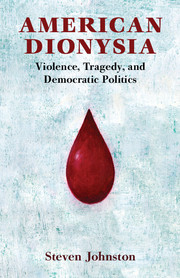Book contents
- Frontmatter
- Contents
- Acknowledgments
- Introduction: There Will Be Blood: Antinomies of Democracy
- 1 American Dionysia
- 2 Democracy at War with Itself: Citizens
- 3 Democracy at War with Itself: Animals
- 4 Forcing Democracy to Be Free: Rousseau to Springsteen
- 5 Two Cheers for Democratic Violence
- 6 New Tragic Democratic Traditions
- Conclusion: Democracy's Tragic Affirmations
- Notes
- Bibliography
- Index
Conclusion: Democracy's Tragic Affirmations
Published online by Cambridge University Press: 05 May 2015
- Frontmatter
- Contents
- Acknowledgments
- Introduction: There Will Be Blood: Antinomies of Democracy
- 1 American Dionysia
- 2 Democracy at War with Itself: Citizens
- 3 Democracy at War with Itself: Animals
- 4 Forcing Democracy to Be Free: Rousseau to Springsteen
- 5 Two Cheers for Democratic Violence
- 6 New Tragic Democratic Traditions
- Conclusion: Democracy's Tragic Affirmations
- Notes
- Bibliography
- Index
Summary
There are two tragedies in life. One is not to get your heart's desire. The other is to get it.
George Bernard Shaw, Man and SupermanContrary to The Man Who Shot Liberty Valance, Shane enjoys a secure place in American cinematic history, at least in the popular imagination. In 1998 it appeared on the American Film Institute's 100 best American movies list, ranked sixty-ninth. Nine years later, in a second polling, it ranked forty-fifth. In 2003 Shane (the character) appeared on the Institute's list of fifty greatest heroes, ranked sixteenth. In the Institute's 2008 genre poll, Shane ranked as the third greatest western, behind The Searchers and High Noon. The first category carries the most prestige; fifteen hundred leading figures in the industry picked Shane from among four hundred nominated films based on critical recognition, cultural significance, historical impact, enduring popularity, and awards won.
It might seem unduly contrarian to disagree with an American cultural consensus, but what if Shane rightly appears on the best one hundred list for the wrong reasons? Here Shane's place on the greatest heroes list might be telling. It suggests the film is to be approached through a romantic frame, as a story at once moving and inspiring, touching and uplifting, in which good defeats evil, justice prevails, and, despite a few rocky moments, all ends well. Not that Shane can't be read this way, but it exacts a stiff price by compromising its possible status as a democratic tragedy on a par with ancient Greek classics. At its most politically problematic, Shane also contains resources for a democratic approach to the constitutive role violence plays in democracy. Do not look to the leading man, though. As with Valance, look to the quiet man who shuns the spotlight and appears to be nothing more than a supporting actor.
- Type
- Chapter
- Information
- American DionysiaViolence, Tragedy, and Democratic Politics, pp. 240 - 248Publisher: Cambridge University PressPrint publication year: 2015



